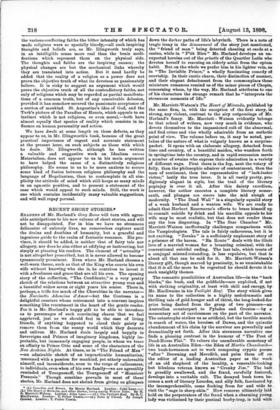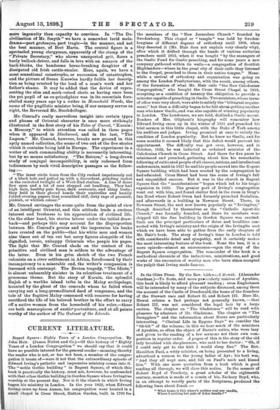RECENT SHORT STORIES.* READERS of Mr. Harland's Grey Roses will
turn with agree- able anticipations to his new volume of short stories, and will not be disappointed. For in him we have no strenuous delineator of unlovely lives, no remorseless explorer amid the drains and dustbins of humanity, but a graceful and ingenious guide to the realm of fantastic romance. His pro- vince, it should be added, is neither that of fairy tale nor allegory, nor does he aim either at edifying or instructing, but simply at pleasing his readers. The element of " actuality " is not altogether proscribed, but it is never allowed to become tyrannously prominent. Even where Mr. Harland chooses a well-worn theme, such as that of the King who courts his own wife without knowing who she is, he contrives to invest it with a freshness and grace that are all his own. The opening story of the collection, "The Confidante," is a very pretty sketch of the relations between an attractive young man and a beautiful widow seven or eight years his senior. There is, perhaps, a trifle too much of the Cherubino in the narrator— the Narcisetto Adoncino d'Amor—but the Contessa is a delightful creature whose retirement into a convent inspires something like resentment in the heart of the gentle reader. For it is Mr. Harland's happy gift to be able to introduce us to personages of such convincing charm that we feel aggrieved, just as we should feel in the case of living friends, if anything happened to cloud their gaiety or remove them from the sunny world which they decorate and enliven. Mr. Harland deals largely and happily in Sovereigns and Princes of imaginary kingdoms, highly im- probable, but immensely engaging people, in whom we trace an affinity to Prince Otto and some of the characters of the New Arabian Nights. At times, as in "The Friend of Man" 0—an admirable sketch 'of an impracticable humanitarian, .i:)nsumed with a passion for mankind, yet utterly unloveable himself, and inconsiderate, even to the verge of callousness, to individuals, even when of his own family—we are agreeably reminded of Tourgneneff, the Tourgueneff of " Monsieur' Francais." Though sunshine prevails in most of these stories, Mr. Harland does not shrink from giving us glimpses
(L) Comedies and Errors. By .Henry Harland. London : Johritane.— 4.) The Heart of Miranda, and other Stories, being mostly Winter Tales. By H. B. Marriott-Watsqn. London: John Lane.—(3.) The Twilight ,13.eef. By H. 0. Maellwaine. London: T. Fisher Unwin.—(4.) Tales of Unrest. By Joseph tionrad. London: T. Fisher Unwin. down the darker paths of life's labyrinth. There is a note of tragic irony in the denouement of the story just mentioned, the " friend of man " being detected cheating at cards at a casino, while in " P'tit Bleu " Mr. Harland develops an un- expected heroine out of the grisette of the Quartier Latin who devotes herself to rescuing an elderly artist from the opium habit. But on the whole we prefer him in his lighter vein, as in " The Invisible Prince," a wholly fascinating comedy of courtship. In their exotic charm, their distinction of manner, and their elegant detachment from the commonplace these miniature romances remind us of the minor pieces of Chopin, concerning whom, by the way, Mr. Harland attributes to one of his characters the strange remark that he " interprets the strenuous moments of life."
Mr. Marriott-Watson's The Heart of Miranda, published by the same firm, is, with the exception of the first story, in strong, nay violent, contrast to the airy outpourings of Mr. Harland's fancy. Mr. Marriott - Watson evidently belongs to that school of writers, now very much in evidence, who devote themselves to the impassioned cult of the abnormal, and find crime and vice wholly admirable from an Mathetic point of view. The volume before us, it may be noted, par- takes of the nature of what is vulgarly known as a surprise- packet. It opens with an elaborate allegory, detached from time and country, of a beautiful maiden, who wanders forth in springtime into the country, and in rapid succession meets a number of swains who express their admiration in a variety of different ways. First there is the fop, next the votary of folly, then the philosophic admirer of contentment, then the man of sentiment, then the representative of "lack-lustre virtue," lastly the true lover. It is all vastly pretty, pro- digiously elegant in style, but the trail of the literary popinjay is over it all. After this dainty exordium, however, the author executes a complete literary somer- sault, and plunges con amore into the mid slough of modernity. " The Dead Wall " is a singularly squalid story of a weak husband and a wanton wife. We are ready to admit that Herbert Rosewarne's efforts to brace himself up to commit suicide by drink and his maudlin appeals to his wife may be most realistic, but that does not render them any the less disgusting. In "The Star Chamber" Mr. Marriott-Watson ineffectually challenges comparisons with the Vampirologists. The tale is fairly cadaverous, but it is not exciting. " Zoraka " is a sufficiently unpleasant story of a prisoner of the harem. " En Route " deals with the illicit love of a married woman for a levanting criminal, with the conventional suicidal ending. The last tale, which treats of a conjugal misunderstanding, is less repulsive, but that is about all that can be said for it. Mr. Marriott-Watson's literary gift, though marred by preciosity, is so unmistakable that it is all the more to be regretted he should devote it to such unsightly themes.
The romantic possibilities of Australian life—in the " back blocks," the bush, and the goldfields—are exploited, if not with striking originality, at least with skill and energy, by Mr. Macllwaine in his Twilight Reef. The story which gives its name to the collection is a highly melodramatic and thrilling tale of gold-hunger and of thirst, the long-looked-for prize being dashed from the grasp of two pioneers—an Australian counterpart to Pylades and Orestes— by a momentary act of carelessness on the part of the narrator. The catastrophe strikes us as artificial, but the terrible march in search of water, the heroism of Dawes, and the quixotic abandonment of his claim by the survivor are powerfully and dramatically set forth. After this strenuous narrative one finds a pleasing contrast in the humour of " The Poet of Dead-Horse Flat." To relieve the unendurable monotony of life in an Australian Eden—the Eden of Martin Chuzzlewit- two bush-townsmen set to work composing cryptic poems " after" Browning and Meredith, and palm them off on the editor of a leading Australian paper as the work of an old shepherd of the locality, a venerable-looking but bibulous veteran known as " Cranky Jim." The bait is greedily swallowed, and the fraud, carefully fostered, develops into a veritable cult. The decayed bush town be- comes a sort of literary Lourdes, and silly folk, fascinated by. the incomprehensible, come flocking from for and wide to visit the " sage in sheep-skin." How remorse ultimately laid hold on the perpetrators of the fraud when a charming young lady was victimised by their poetical booby-trap, is told with
more ingenuity than capacity to convince. In "The De-
civilisation of Mr. Smyth" we have a somewhat lurid melo- drama—part grotesque, part tragic—in the manner, and not the best manner, of Bret Harte. The central figure is a spectacled young clergyman, apparently of the stamp of the " Private Secretary," who shows unexpected grit, floors a burly bullock-driver, and falls in love with an amazon of the back-blocks, the handsome horse-breaking daughter of a dissipated old Irish cattle-stealer. Here, again, we have a most sensational catastrophe, or succession of catastrophes, and the picture of Susan Knowles hardly fulfils her descrip- tion as being crushed by the load of a man's work and her father's shame. It may be added that the device of repre- senting the slim and meek-voiced cleric as having once been
the pet pupil of an ex-prizefighter was in its essentials fore- stalled many years ago by a writer in Household Words, the
name of the pugilistic minister being, if our memory serves us right, the Reverend Mr. Stockdolloger.
Mr. Conrad's really marvellous insight into certain types and phases of Oriental character is once more strikingly illustrated in the first story of his Tales of Unrest, "Karain : a Memory," to which attention was called in these pages when it appeared in Blackwood, and in the last, " The
Lagoon." Mr. Conrad, however, breaks new ground in this aptly named collection, the scene of two out of the five stories which it contains being laid in Europe. The experiment in a writer of such commanding ability is necessarily interesting, but by no means satisfactory. "The Return," a long-drawn study of conjugal incompatibility, is only redeemed from tediousness by such vivid descriptive passages as the follow- ing :—
" The inner circle train from the City rushed impetuously out of a black hole and pulled up with a discordant, grinding racket in the smirched twilight of a West-End station. A line of doors flew open and a lot of men stepped out headlong. They had high hats, healthy pale faces, dark overcoats, and shiny boots ; they held in their gloved hands their umbrellas and hastily folded evening papers that resembled stiff, dirty rags of greenish, pinkish, or whitish colour."
Mr. Conrad envisages the scene quite from the point of view of an intelligent Oriental, and this attitude lends a curious
interest and freshness to his appreciation of civilised life. On the other hand, his stories labour under the initial draw- back—and perhaps this may account for the disproportion between Mr. Conrad's genius and the impression his books have created on the public—that his white men and women nine times out of ten cut but sorry figures alongside of the dignified, heroic, unhappy Orientals who people his pages. The light that Mr. Conrad sheds on the contact of the primitive and civilised man is seldom to the advantage of the latter. Even in his grim sketch of the two French colonists on a river settlement in Africa, foredoomed by their incompetency to a miserable end, the writer's compassion is leavened with contempt. The Breton tragedy, " The Idiots," is almost unbearably sinister in its relentless treatment of a gruesome theme. But the story of Karain, the splendid Rajah of a warlike island tribe in the Malay archipelago, haunted by the ghost of the comrade whom he failed when carrying out a long-premeditated deed of vengeance, and the tale of the fugitive Malay consumed with remorse for having sacrificed the life of his beloved brother in the effort to carry off a native woman from the household of his ruler,—these
are both masterpieces of exotics portraiture, and at all points worthy of the author of The Outcast of the Islands.



































 Previous page
Previous page